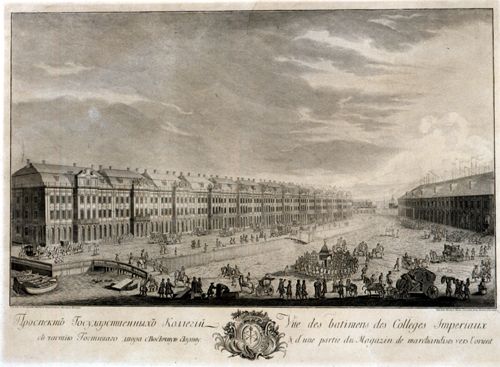|
Collegium Of Justice
The Collegium of Justice (also College) was a Russian executive body (collegium), created in the government reform of 1717. It was de-established during the decentralising reforms of Catherine II of Russia. Its first President was Andrey Matveev Count Andrey Artamonovich Matveev () (1666–1728) was a Russian statesman of the Petrine epoch best remembered as one of the first Russian ambassadors and Peter the Great's agent in London and The Hague. Andrey Matveyev was the son of the more .... References * * * Collegia of the Russian Empire 1717 establishments in Russia {{Russia-hist-stub ... [...More Info...] [...Related Items...] OR: [Wikipedia] [Google] [Baidu] |
Collegium (ministry)
The Collegium () was a type of government department in Russian Empire, Imperial Russia. It was established in 1717 by Peter I of Russia, Peter the Great to replace the system of Prikaz. They were housed in the Twelve Collegia building in Vasilyevsky Island, Saint Petersburg. In 1802, the Collegium was incorporated into and gradually replaced by the newly created Manifesto on the Establishment of Ministries, system of Ministries. Origin Following the formation of the Governing Senate in 1711, the Tsar Peter I sought to make more reforms on the imperial government bodies. He planned to replace the Prikaz with a new type of government agency, based on two new principles: # Systematic separation of departments, in order to avoid overlapping/omission of certain governmental duties under the Prikaz system; # Advisory procedure for resolving cases. Similar form of central government institutions were adopted in Sweden and a number of German states. In 1717, Collegium was introduced ... [...More Info...] [...Related Items...] OR: [Wikipedia] [Google] [Baidu] |
Government Reform Of Peter I
The government reforms of Peter I aimed to modernize the Tsardom of Russia (later the Russian Empire) based on Western European models. Peter ascended to the throne at the age of 10 in 1682; he ruled jointly with his half-brother Ivan V. After Ivan's death in 1696, Peter started his series of sweeping reforms. At first he intended these reforms to support the Great Northern War of 1700-1721; later, more systematic reforms significantly changed the internal structure and administration of the state. Background During the Great Northern War (1700–1721), which dominated most of Peter's reign, Russia, along with a host of allies, seized control of the Baltic Sea from Sweden and gained considerable influence in Central and Eastern Europe. The war, one of history's costliest at the time, consumed significant financial and economic resources, and the administrative system Peter had inherited from his predecessors strained to gather and manage resources. During his Grand Embassy (, ... [...More Info...] [...Related Items...] OR: [Wikipedia] [Google] [Baidu] |
Catherine II Of Russia
Catherine II. (born Princess Sophie of Anhalt-Zerbst; 2 May 172917 November 1796), most commonly known as Catherine the Great, was the reigning empress of Russia from 1762 to 1796. She came to power after overthrowing her husband, Peter III. Under her long reign, inspired by the ideas of the Enlightenment, Russia experienced a renaissance of culture and sciences, which led to the founding of many new cities, universities, and theatres, along with large-scale immigration from the rest of Europe and the recognition of Russia as one of the great powers of Europe. In her accession to power and her rule of the empire, Catherine often relied on her noble favourites, most notably Count Grigory Orlov and Grigory Potemkin. Assisted by highly successful generals such as Alexander Suvorov and Pyotr Rumyantsev, and admirals such as Samuel Greig and Fyodor Ushakov, she governed at a time when the Russian Empire was expanding rapidly by conquest and diplomacy. In the south, th ... [...More Info...] [...Related Items...] OR: [Wikipedia] [Google] [Baidu] |
Andrey Matveev
Count Andrey Artamonovich Matveev () (1666–1728) was a Russian statesman of the Petrine epoch best remembered as one of the first Russian ambassadors and Peter the Great's agent in London and The Hague. Andrey Matveyev was the son of the more famous Artamon Matveyev by a Scottish woman, Eudoxia Hamilton. At the age of eight he was granted a rank of ''chamber stolnik'' (комнатный стольник) but was exiled together with his father during Feodor III's early reign. The Matveyevs returned to Moscow on 11 May 1682, and four days later Artamon Matveyev was killed by the rebellious ''Streltsy'' during the Moscow Uprising of 1682, while Andrey fled the capital again. In 1691–1693 he served as '' voyevoda'' in the Dvina Region. Peter the Great, who had deeply respected Matveyev the elder and whose own mother had been brought up in the Matveyev family, sent him in 1700 as ambassador extraordinary and plenipotentiary, firstly in the Dutch Republic (1699–1712), afterwar ... [...More Info...] [...Related Items...] OR: [Wikipedia] [Google] [Baidu] |
Collegia Of The Russian Empire
A (: ) or college was any association in ancient Rome that acted as a legal entity. Such associations could be civil or religious. The word literally means "society", from ("colleague"). They functioned as social clubs or religious collectives whose members worked towards their shared interests. These shared interests encompassed a wide range of the various aspects of urban life; including political interests, cult practices, professions, trade, and civic services. The social connections fostered by ''collegia'' contributed to their influence on politics and the economy; acting as lobbying groups and representative groups for traders and merchants. Some ''collegia'' were linked to participating in political violence and social unrest, which resulted in the suppression of social associations by the Roman government. Following the passage of the ''lex Julia'' during the reign of Julius Caesar as consul and dictator of the Roman Republic (49–44 BC), and their reaffirmation dur ... [...More Info...] [...Related Items...] OR: [Wikipedia] [Google] [Baidu] |


